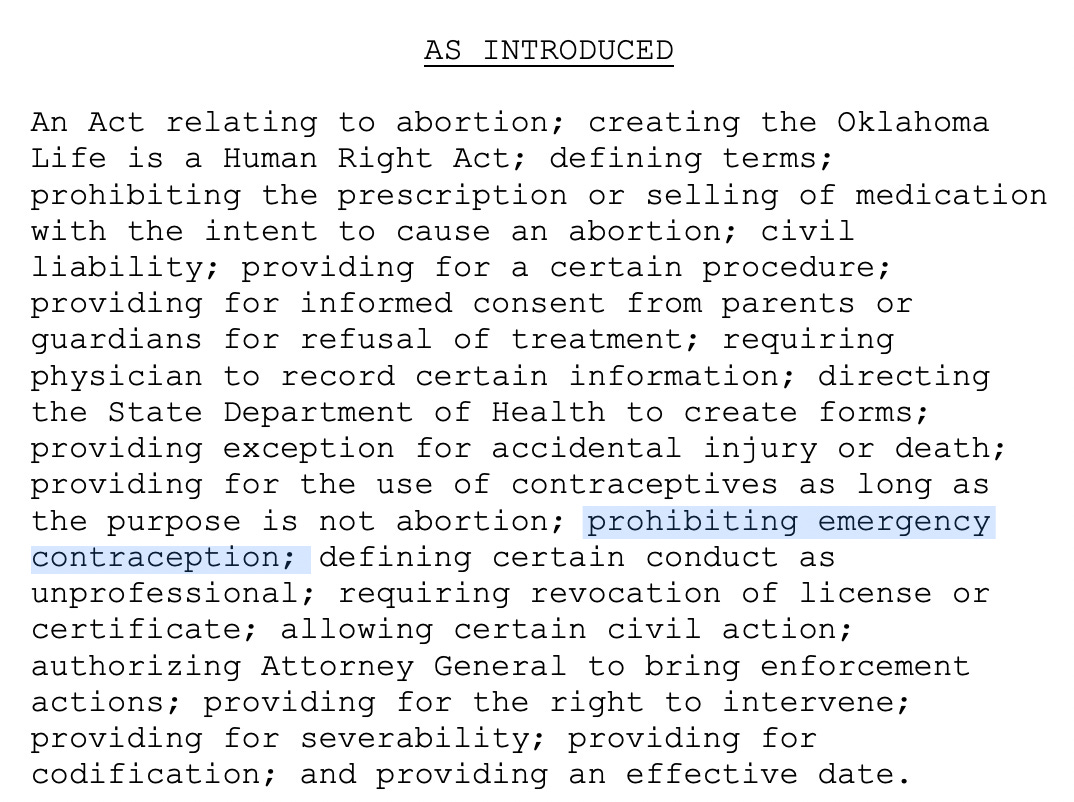The Anti-Abortion Blueprint
An Oklahoma bill lays out Republicans' national abortion strategy
Since Roe was overturned, I’ve covered all sorts of anti-abortion legislation: bills that would criminalize miscarriage, legislation to track pregnant women’s data, even bills that would make abortion punishable by the death penalty. I don’t know if I’ve ever seen a bill like this one out of Oklahoma, though—which so perfectly captures the anti-abortion movement’s goals for the entire country.
Oklahoma House Bill 3216 epitomizes so much of what I’ve warned about since launching Abortion, Every Day: It would ban emergency contraception and IUDs, create a state database of women who have had an abortions, potentially force doctors to perform c-sections instead of providing life-saving abortions, and redefine life-saving abortions as “pre-viability separation procedures.”
In short, it’s an anti-abortion dream bill. Which makes sense, given that Oklahoma Republican Rep. Kevin West wrote it with Alliance Defending Freedom—the conservative legal group that overturned Roe and is going after mifepristone. That means this legislation is a model for what the anti-abortion movement wants to see nationally.
So let’s get into it, starting with contraception.
If you’ve been reading AED for a while, you know all about conservatives’ war on birth control, and how they’ve been trying to redefine certain forms of contraception as abortifacients. Here’s a refresher if you need one:
The short version is that anti-abortion groups argue that pregnancy begins at the moment of fertilization—not when a fertilized egg implants in the uterus. The reason they make that distinction is because it opens a door to ban birth control: these groups claim emergency contraception and IUDs disrupt the implantation of a fertilized egg and are therefore abortifacients.
The science doesn’t back that up, but conservative groups have spent years building this argument in the courts. In 2014, for example, the retail chain Hobby Lobby—supported by Republican politicians and anti-abortion groups—argued that they shouldn’t have to cover employees’ contraception because IUDs and the morning after-pill end pregnancies. Again, that’s not true—but the company still won their case before the Supreme Court.
And if you had any doubt that the Oklahoma bill is connected to that broader national anti-abortion effort, consider what reporter Susan Rinkunas flagged: The other business in the Hobby Lobby case, Conestoga Wood, was represented by Alliance Defending Freedom—the extremist group that drafted Oklahoma’s bill.
All of which is to say, this strategy has been in the works for a long time.
Now, it’s not new for Republicans to sneak language into their legislation that could ban birth control; I’ve covered bills in multiple states where lawmakers have done just that. But Oklahoma House Bill 3216 goes even further—it specifically and explicitly prohibits emergency contraception:
The fact that they’re not hiding their attempt to ban birth control is really, really scary. It means they’re getting bolder. (Or more desperate, which is also scary.)
Speaking of getting bolder, let’s talk about the proposed state registry of abortion patients. As The Oklahoman reports, the law would require the state to give women “a unique patient identifier” so that the government can “identify the woman” who had an abortion. Obviously, this is a gross violation of patient privacy. But it’s also a scare tactic directed at both patients and providers.
Because remember, Oklahoma’s ban only allows for abortion when a pregnant person’s life is at risk. As is the case in most states with similar bans, these ‘exceptions’ are often so narrowly defined that patients with life-threatening pregnancies still have to leave their state to get care—either because the courts won’t allow it, or because doctors are too afraid to firmly say that a pregnancy is imminently life-threatening. (Kate Cox’s case is a good example of this.)
So there’s already a lot of fear and confusion around what legally constitutes a life-threatening pregnancy. Once you add the knowledge that someone would be identified and tracked if given an abortion, it’s much less likely that a patient would want to get care in Oklahoma—or that a doctor would be willing to give it. It creates an even greater chilling effect.
But there’s more: This kind of patient tracking is also key to the anti-abortion movement’s strategy of drumming up fake statistics. Think back to the investigation I did into abortion ‘complication’ reporting in anti-choice states: These are the laws that force medical providers to report health ‘complications’ to the state even when there’s no connection to a patient’s previous abortion. (I used myself as an example here if you want a sense of how that works in practice.) The idea is to fabricate data that ‘proves’ abortion is dangerous, despite all evidence to the contrary:
Consider how this could work in Oklahoma, should the law be passed. If the state has a yearly report of how many women had abortions to save their lives—and that report is very, very short because of the chilling effect I described above—it gives Republicans the ability to say, see, women don’t really need abortions to save their lives after all! They are thinking five steps ahead.
Perhaps nothing is more telling, however, than the language of this bill. For over a year, I’ve been predicting how the anti-abortion movement would change medical and legal terminology. Some of those changes are part of their campaign to pressure and force women to carry doomed pregnancies to term: They want doctors to call nonviable pregnancies ‘pre-viable’, for example, and to characterize fatal fetal conditions as ‘potentially life-limiting’. The idea is to confuse and mislead women about the health of their pregnancies.
More broadly, though, this attack on language about divorcing abortion from healthcare. I wrote about this in detail in The New York Times, but the short version is that Republicans are so desperate to claim that women never need abortions to save their health or lives, that they’re trying to change the definition of abortion itself.
We’ve seen multiple states, for example, pass laws to ‘clarify’ that abortion doesn’t include treatment for miscarriages or ectopic pregnancies. Instead, they call it a ‘maternal fetal separation procedure’.
You all know I’ve been warning about this term for a long time—I even flagged it for Senate Democrats. It comes from a “Glossary of Medical Terms” pushed by the American Association of Pro-Life Obstetricians and Gynecologists, an extremist anti-abortion group that would rather see women suffer and die than have an abortion. (This isn’t hyperbole: For example, AAPLOG advises hospitals to force women into labor despite deadly pregnancies so they can deliver “an intact fetal body.”)
To be clear, there is no such thing as a ‘maternal fetal separation procedure’—this is an entirely made-up term. But the anti-abortion movement knows that pregnancy can be deadly, and that sometimes the only way to save a pregnant person’s life is to stop them from being pregnant. Instead of admitting that abortion is healthcare, they created this nonsense phrase as a workaround; suddenly life-saving abortions aren’t abortions at all.
But the danger of ‘maternal fetal separation procedure’ is more than just rhetorical—it allows the anti-abortion movement to dictate how a life-threatening pregnancy is ended. One of more disturbing trends I’ve been tracking is legislation that forces doctors induce vaginal labor or perform c-sections rather than provide a standard abortion procedure.
They would rather torture women with complicated and unnecessary surgeries and medical interventions than admit that abortion is healthcare. Indeed, check out this language from the Oklahoma bill, which brings it all together:
“When performing a pre-viability separation procedure as permitted under this act, the physician shall make reasonable medical efforts under the circumstances to preserve both the life of the pregnant woman and the life of her unborn child in a manner consistent with reasonable medical practice.”
If you’re thinking that the language about care being “consistent with reasonable medical practice” would save a woman from all this horror, you’d be wrong. Anti-abortion groups argue that vaginal labor and c-sections are “medically standard” for life-threatening pregnancies, and doctors have already started reporting being forced to end pregnancies in this way despite the physical and mental risk to their patients.
The other thing to note about this bill is that while it claims to allow for abortions—excuse me, ‘separations’—in cases of miscarriage, that’s just not true. As is the case with so many abortion bans, the Oklahoma bill defines miscarriage care as removing “a dead unborn human being.” That means women can’t get care until the fetal heartbeat stops—the kind of waiting game that’s put women in the ICU with sepsis.
I could keep going, but I think you get the point: The anti-abortion movement is giving us a good chunk of their national blueprint here. Sure, they’ll never explicitly admit that this Oklahoma bill is a model for the whole country—but they might as well. Because after years of dropping in tactics here and there, anti-choice groups are putting their strategies together all in one place.
I predict that in the coming months, we’ll see even more anti-abortion bills that read like extremist wishlists. In addition to everything above, there will also be travel bans, abortion pill ‘trafficking’ laws and prenatal ‘counseling’ mandates. They’re all trial balloons, being sent up with ever more urgency as we head towards November.
These bills will be bigger, bolder, and more extreme than ever. And we can’t fall into the trap of believing that they don’t matter if we don’t live in the state they’re proposed in.
Oh, and Oklahoma’s Rep. West? In the face of public outrage, he says maybe he’d be willing to “tweak” parts of the bill—a good reminder that Republicans will try to feed us meaningless scraps as ‘compromise’.
The anti-abortion movement telling us exactly what they want for the country. We’d do well to listen.









What worries me (and there are so very many worries these days about the grievous loss of personal freedoms) is that these laws are going to become so entrenched that even WHEN we win a second term for Biden (who is himself pretty conservative in his affirmations of choice) and the Senate and the House, there will be decades of fighting any future federal laws guaranteeing a woman's right to an abortion.
The Abortion Protection Act bill, or whatever it will be called, will be ignored and litigated by these women-hating state legislators while keeping these laws on their books. Appeal after appeal while not adhering to the federal law means thousands of women will still be subjected to forced birth.
But we can be 100% certain that if we don't win with Biden and give him a majority in both the Senate and House, these laws will become so deep-seated that they will prevail for decades.
Thank you for your tireless work. This is so gross and upsetting.